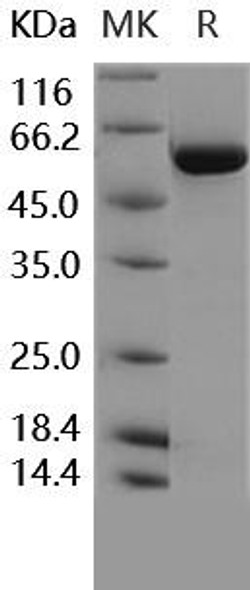Description
| Product Name: | Recombinant Mouse ALK-5/TGFBR1 (C-Fc) |
| Product Code: | RPES6644 |
| Size: | 10µg |
| Species: | Mouse |
| Expression Host: | HEK293 Cells |
| Synonyms: | AAT5, activin A receptor type II-like kinase, 53kD, ACVRLK4, ALK-5, ALK-5ALK5, LDS1A, LDS2A, SKR4, tbetaR-I, TGFB1R1, TGF-beta receptor type I, TGFbetaRI, TGFBR1, TGF-bRI, TGFR-1 |
| Mol Mass: | 37.6 kDa |
| AP Mol Mass: | 40-60 kDa |
| Tag: | C-Fc |
| Purity: | > 95 % as determined by reducing SDS-PAGE. |
| Endotoxin Level: | < 1.0 EU per μg of the protein as determined by the LAL method. |
| Bio Activity: | Testing in progress |
| Sequence: | Leu30-Glu125 |
| Accession: | Q64729 |
| Storage: | Generally, lyophilized proteins are stable for up to 12 months when stored at -20 to -80°C. Reconstituted protein solution can be stored at 4-8°C for 2-7 days. Aliquots of reconstituted samples are stable at < -20°C for 3 months. |
| Shipping: | This product is provided as lyophilized powder which is shipped with ice packs. |
| Formulation: | Lyophilized from a 0.2 μm filtered solution of PBS, pH 7.4. Normally 5 % - 8 % trehalose, mannitol and 0.01% Tween80 are added as protectants before lyophilization. Please refer to the specific buffer information in the printed manual. |
| Reconstitution: | Please refer to the printed manual for detailed information. |
| Background: | TGF-beta RI, also called ALK-5, is an approximately 55 kDa type I transmembrane serine/threonine receptor kinase. In the presence of TGF-beta, TGF-beta RI forms a complex with, and is phosphorylated by, TGF-beta RII. Phosphorylated TGF-beta RI can then transiently bind and phosphorylate Smad2 and Smad3. TGF-beta functions as a tumor suppressor by inhibiting the cell cycle in the G1 phase. Administration of TGF-beta is able to protect against mammary tumor development in transgenic mouse models in vivo. Disruption of the TGF-beta/SMAD pathway has been implicated in a variety of human cancers, with the majority of colon and gastric cancers being caused by an inactivating mutation of TGF-beta RII. TGF-beta RI is likely important during development, since mice deficient for TGF-beta RI die at midgestation with severe defects in vascular development of the yolk sac and placenta, and an absence of circulating red blood cells. Furthermore, TGF-beta RI appears to be involved in proper lymphatic network development. |






